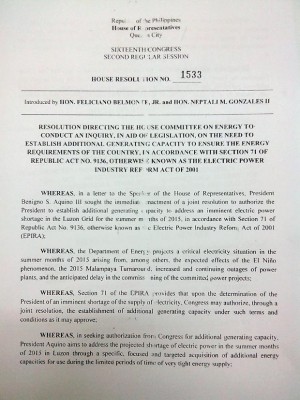House defers granting Aquino emergency powers
MANILA, Philippines—Leaders of the House of Representatives have withheld granting President Benigno Aquino III emergency powers to avert a looming power crisis and instead agreed to call for an inquiry into whether there’s really a need for them.
Speaker Feliciano Belmonte Jr. and Majority Floor Leader Neptali Gonzales II on Friday directed the energy committee to conduct, in aid of legislation, an inquiry 登n the need to establish additional generating capacity to ensure the energy requirements of the country.”
In House Resolution 1533, they underscored the need 鍍o be provided with the necessary, relevant and sufficient information on the actual or projected requirements needed to ensure the energy requirements of the country…”
Aquino has asked Congress to grant him the authority, in accordance with the Electric Power Reform Industry Act (Epira), to contract additional power capacity to address the looming power shortage in the summer of 2015.
The Epira allows emergency powers to the Chief Executive “upon the determination by the President of the Philippines of an imminent shortage of the supply of electricity.”
Congress may authorize, through a joint resolution, the establishment of additional generating capacity under such terms and conditions as it may approve, Section 71 of the law reads.
Energy Secretary Carlos Jericho Petilla has said the Department of Energy was expecting an 800 megawatts (MW) shortage in 2015, and that the President must contract at least 300 MW of the total shortage.
The DOE is entertaining a number of options to fill the projected shortfall, including the lease or purchase of power generators, which will cost the government at least P6 billion and P10 billion, respectively, and a voluntary program tapping the excess energy supply of private companies, which will cost much less.
Petilla said Congress must pass the joint resolution giving Aquino powers by September as the purchase or lease of power generators requires at least three months.
But the House leadership is leaning toward a third option, the Interruptible Load Program (ILP), which is similar to a scheme in Mindanao giving incentives to establishments to generate their own power and save energy.
The House version is possibly ILP, Belmonte told reporters on Thursday. “That’s for us. We have not heard from the Senate, so the advice is we will check first.”
Belmonte said the President could simply convince the private sector to take part in the voluntary program, assuming Congress chooses ILP as the way to go. “I think they [companies) can be persuaded.”
He said House leaders met with Petilla again Wednesday night with the energy secretary backing the purchase or lease options, as these would give government more control, unlike ILP, which would depend on the participation of the private sector.
“In his way of thinking we need to have full control of the situation, and the only way of doing it is by bringing in power either by lease or purchase, but most likely, lease,” Belmonte said.
But Belmonte said the position of the House leadership was to exert every effort to look for more power at less cost to government and the consumers.
“For instance, the power of malls. There are many companies here with excess power. We can ask them. But he [Petilla] said we cannot control them, which is worrying. Although they have the power, they might not cooperate with us,” Belmonte said.
Under Section 71 of the Electric Power Industry Reform Act, Congress may authorize the establishment of additional generating capacity upon determination by the President of an imminent shortage of electricity.
The energy department said the projected shortage in power supply may be due to the looming El Nino phenomenon, the maintenance shutdown of the Malampaya power plan, increased or continuing outages of power plants, and the delay in commissioning of committed power projects.
RELATED STORIES
Osmeña hesitant to grant Aquino emergency powers, favors cheaper options
